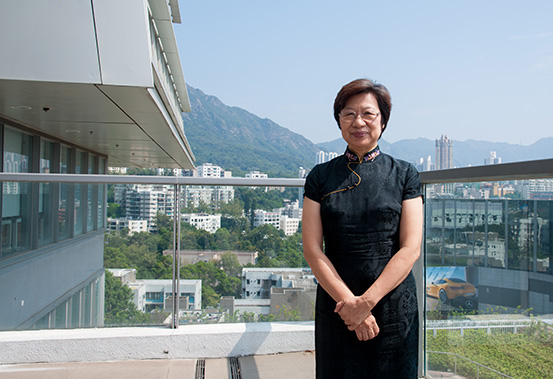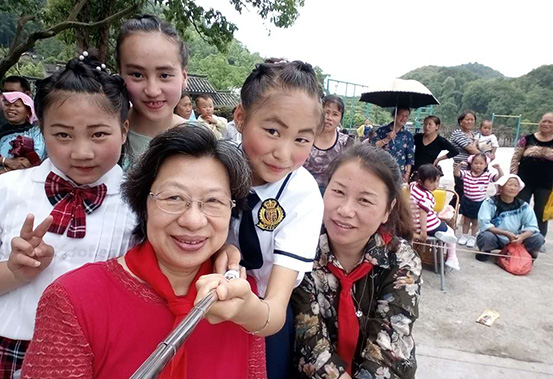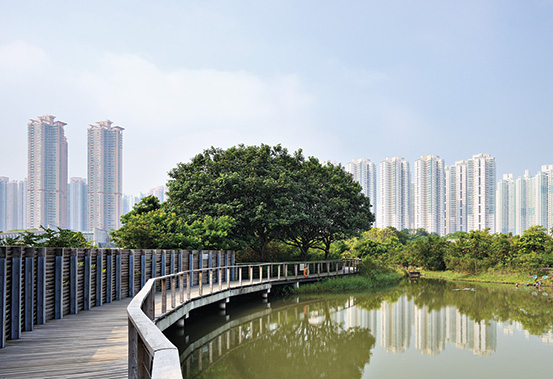Dorothy Pang is a veteran Hong Kong educationalist, having served as Principal of Methodist College and Bishop Hall Jubilee School before retiring. She now works as a school development consultant for rural schools in Xiangxi, western Hunan. Pang has completed two master degree programmes at CityU – an MA (TESL) and College of Business EMBA. Here she shares her experience of Tin Shui Wai, of eco-farming and education in mainland China, and her thoughts on the teaching of critical thinking.
Frontier town
Tin Shui Wai – for Hong Kong people, the very name is loaded. You can feel the undertow.
A walled village built on the marshes, where the sea water meets the fresh. Isolated in Hong Kong's furthest north west, it was a village of farmers – in the old days rice, fresh water fish, and oysters. It is a new town synonymous with unemployment, depression and suicide. For many it was a new town too far. The place where the Hong Kong public housing dream finally sank: A City of Sadness.
"Financial problems, employment problems, social problems. So many pretty ladies from Hunan or other places in China worked in Shenzhen and met Hong Kong guys. They would marry and come to Hong Kong. They were shocked to find that Hong Kong was like that, and there were so many family problems. So lots of tragedies happened," says Pang.
Tin Shui Wai has left an imprint on the psyche. In her 2006 best-seller The Voices of Tin Shui Wai Women, Eva Chan Sik-chee, a journalism senior lecturer at Chinese University, chronicled the everyday lives of a dozen housewives. Against a backdrop of unemployment and marginalisation, the women show resilience, courage and determination. This was followed by the haunting 2008 film, The Way We Are(天水圍的日與夜)directed by Ann Hui. So the world knows something of Tin Shui Wai.
Then things changed. Now at last the town is fully connected. West Rail, and with it hope, arrived in 2003. Bright Lights, Big City – Central is just 40 minutes away.
Tin Shui Wai is also the sort of place that attracts movers and shakers.
Pang spent nine years of her career there. As Curriculum Coordinator she had helped the founders and pioneer teachers make the school famous for sustainable development education. Recently she went back. Now the gardens have grown wild, and the campus no longer green. But she still sees it as a frontier town, a place where work can still usefully be done.
"Because of my work there I started to have feelings for the place. So after my retirement in 2008 I thought I should do something for this place, and later I became a blogger. I made my title 'Tinshuiwaidorothy', and actually I have recently set up a company called loveTinShuiWai.com. The aim is to give these ladies something to do."
And Tin Shui Wai is not the only frontier she is interested in.
Frontier farming
Pang has recently returned from Hunan province. Mu Li is a village close to Feng Huang County, a grade one historical site, and one of the major tourist hot spots of western Hunan. She went to visit a friend who used to be a designer in the USA. The friend had met some Miao tribe ladies, and then went to learn eco-farming from a Sichuan farming expert, who was following Korean farming methods.
"They raise pigs – but you don't smell any bad smells! The pigs are raised in sties with wood, straw and sawdust, and enzymes decompose the pig waste. The dirt sinks, and the pigs roll in the sawdust which helps clean their bodies. The waste is regularly drawn from the bottom as fertiliser for the fields."
"I started to explore the possibility of making the farm more known to the villagers through the Mu Li Xiang Comprehensive School, which provides boarding places to students from the other villages in the vicinity. With students educated in the concepts of sustainable development and eco-farming, there is a chance that the young people will choose to stay on the land."
Hope for the future
"Migrant workers are moving back into the cities, towns and villages in the centre and west of China. Entrepreneurs are coming back and investing in their home villages. Schools are sponsored by their alumni and other organisations."
Pang sees a future where China will overtake Hong Kong. She points out technology in education. The central government will soon have two million video lessons on their video platform. This brings new meaning to the acronym MOOCs – Massive Open Online Courses. Content is provided by the teachers, participation is compulsory, and scale is indeed massive.
"Each teacher must be able to produce one model video lesson on one of the lessons in the textbook. If you haven't lived in China you wouldn't believe it. In China things work! No argument. When you are sleeping at night they send you a message: tomorrow you should be at the meeting at 8.30am. You will be there!"
Hong Kong, she thinks, lags behind.
" Martin Luther had a sound database before he spoke "
"In the use of education technology to stretch the mind, Singapore is more advanced than us. Students learn new technology and stretch their minds, improve the mind, and become global citizens."
But China is catching up. By September 2016, all village schools in Feng Huang will be equipped with multi-media facilities and powerful internet connections for all classrooms. One of the foci of the Thirteenth Five-year Plan is to narrow the gap between rural and city schools, and to use information and communications technology to improve teaching and learning.
"The Hong Kong-based charity which I collaborate with now, Reading Dreams Foundation Limited, has kicked off our Reading-based English Enhancement Programme in Mu Li Comprehensive Primary School. I demonstrated how to use the online English Reading Programme i-learner.com.cn, and English picture books donated to the school. Leaders of the Feng Huang Education Department, English Curriculum Officers, senior managers of Mu Li School, and representatives from Jin Xin Comprehensive Primary School in the neighboring village were amazed to see the students' interest and high level of engagement. I-learner is a Hong Kong brand which has had over half of the market share among primary schools in Hong Kong for more than eight years. Mr Yao, Secretary of Education of Feng Huang immediately gave a green light to this pilot project, and he will follow through the upgrading of equipment and facilities."
"On 1st June 2016, Mu Li and Jin Xin schools sent students to perform English story telling and other programmes on Children's Day. We are expecting positive outcomes in the Grade 6 public English examinations."
This is China, no argument, no delay, all for the good of the children.
Rice paddies transformed to wet lands at Tin Shui Wai.
Frontier thinking
Is the teaching of critical thinking successful in Hong Kong?
"No, definitely not! Let's take Liberal Studies originally aimed at nurturing students' critical thinking. I taught it way back in 1998. I found that the way it is taught now is not really based on sound knowledge. Socalled critical thinking is just a bunch of resources downloaded from the internet."
"Then they put these stakeholders' perspectives together to make a case study. Here is a banker, this is a farmworker. Then you look at an issue like building a rail track over farmland. You have to look at the stakeholders' views before coming to any judgement. That's only part of critical thinking."
"To me as an educator the very basic things are literacy, and a foundation of knowledge, and then there are whole steps of value education and knowledge. Many students' essays are just based on what they have downloaded from the internet, or interviews with this stakeholder, or that stakeholder."
"But the foundation, the very basic knowledge such as the content of economics, is not there. The whole curriculum from primary to secondary is fragmented in Hong Kong."
"You need that foundation before you come to a view, make a judgement, and write an essay. When you make a judgement about government policy, you should know about the government. In the old days we had economics and public affairs, health education, and science. Now we have general studies. It's like salad. It's not systematic."
"The basis of discussion is absent. Critical thinking has become short for rebelliousness. But rebelliousness based on what? Martin Luther rebelled against the Catholic Church, but he had a sound database before he came to a conclusion that he should voice out his opinion."



